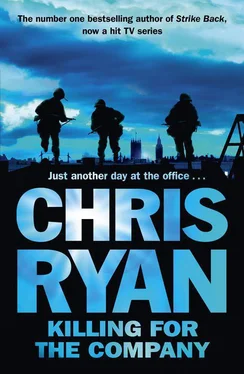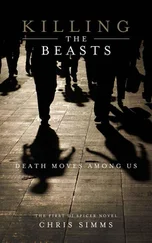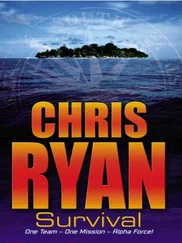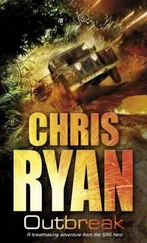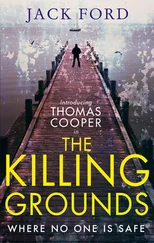It was rudimentary that they shouldn’t walk any further than necessary in a suicide belt. They’d be nervous. Sweating. Conspicuous. And with Jerusalem in a state of high alert, no one in their right mind would risk them being on the streets for any longer than necessary.
What about the bombers themselves? Would he trust them to go ahead with their suicide mission? He thought back to Gaza, to the kid with the remote detonator. Truth was, even the most idealistic nutter could bottle it at the last minute. If Luke was organising this thing, he’d give the bombers as little information as possible, and only issue their final instructions at the very last minute. He’d make sure they got as close to the target site as possible before leaving them to their own explosive devices…
His Sig was where he’d left it. Luke shouldered the Bergen and hurried from the alleyway. Slowly, he was working on a plan.
If the squadron was here with him, he’d have eyes on every gate in the city and the Western Wall plaza would be surrounded by snipers. But there was no squadron. No backup. Just Luke. And if he let anybody know where he was, there’d be a team on its way to lift him within minutes. All he could do was watch the gate nearest to the Western Wall.
The tourist map of the Old Town was a photograph in his mind. He headed south between the city’s Jewish and Armenian Quarters. When the road forked, he headed south-west and five minutes later he found himself approaching the Zion Gate. It was small — barely the width of a car — and as Luke passed through it he looked back up at the city walls. The area around the stone entrance was pockmarked with bullet holes — a reminder of Jerusalem’s violent past.
Luke kept his head down as he skirted east round the city walls. In just a couple of minutes he arrived at another gate. His mental map told him that this was the Dung Gate, the closest access point to the wall. It formed a lower entrance than the Zion Gate — about three metres — but at five metres was a little wider. To its left was an olive tree; to its right, three palms. There were no bullet marks here. But more people were walking in and out. Cars. Pedestrians. It was late, but still busy.
He stood for a moment and stared at the gate. If he was right, any bomber heading for the Western Wall would be likely to pass through here.
If he was right.
From somewhere nearby, the smell of cooking food reached his nose. A couple of old men passed him, speaking loudly and clearly arguing. A kid went by with a pile of postcards that concertinaed out into a long strip.
Just ordinary life and it made him pause. He remembered the way his Regiment colleagues had looked at him back at the base. Like he’d lost it. Luke closed his eyes for a moment. He couldn’t be imagining all this, could he? He couldn’t be mad? Was he on the wrong track? About Stratton? About the bombers?
But then he remembered Chet and Suze and the troops mobilising around the Middle East. He remembered the ruthlessness of Maya Bloom and the madness in Stratton’s eyes.
A church bell rang somewhere in the distance. He counted the chimes. They were sombre. Stately. Twelve of them.
Midnight.
Hanukkah had arrived. In eleven hours, he would know.
In the meantime, he couldn’t loiter here. With the military presence so high he’d soon be observed. But he needed to set up surveillance on the Dung Gate, and quickly.
And that meant finding a workable OP.
10 December.
07.00 hrs.
On the eastern outskirts of Tel Aviv, in a well-to-do suburb where the roads were gated and the houses large, the previous evening’s storm was just an unpleasant memory. The sky was clear and crisp, and a white bus was waiting outside the Scheiber Elementary School for Girls, its engine running. The front door of the bus was open and a pretty young woman with dark, curly hair and almond eyes stood just next to it with a clipboard in her hand. On the pavement in front of her was a well-behaved line of little ladies, all aged either seven or eight. They wore home clothes, and little backpacks over their shoulders which contained lunches that would no doubt be eaten before they’d gone a few kilometres.
Today was a holiday, of course. The first day of the Festival of Lights. The teachers were glad to sacrifice one of their precious holiday days to give the girls the chance to travel to Jerusalem, to see the celebrations in that holy place for themselves. A visit to the Western Wall and then back to their families, to light the first of the eight candles of Hanukkah, eat a special meal and sing festive songs. No wonder they’d all looked excited as they said goodbye to their mums before joining their schoolmates in the queue and filing into the bus. There were thirty-five girls in all, with four teachers to look after them. Miss Leibovitz ticked each child’s name on her clipboard as they boarded the bus and then, when she was sure everybody was there, she climbed up into the long vehicle herself.
The driver was a man in his forties with a small paunch and an open-necked shirt. He pressed a button and the door closed.
‘All ready?’ he asked above the children’s babble.
‘All ready,’ the teacher replied with a smile. And as she strapped herself into her seat at the front — her three female colleagues having already installed themselves among the party — the bus moved off.
‘How long till we get there, Miss Leibovitz?’ a voice asked from behind her.
She looked round to see the face of one of her favourites — an earnest little girl called Natasha, who wore red ribbons in her beautifully plaited pigtails.
‘Two hours, Natasha darling. Just two hours. We’ll be there before you know it.’
Natasha smiled, then sat back down in her seat and gazed out of the window just as they passed a green sign with a white arrow and a single word in Hebrew., it read.
Jerusalem.
Jerusalem.
A city divided. A Jewish Quarter. A Christian Quarter. An Islamic Quarter. An Armenian Quarter. A place for everyone and no one.
And then there was East Jerusalem. Occupied by the Arabs and governed by the Palestinian Authority. Adjoining the Old Town and the West Bank, a symbol of the city’s warlike past and fractured present.
It was in East Jerusalem that four people found themselves now, in the basement of a poor and unassuming house. Three men, one woman. The men were naked apart from their underpants; the woman had covered herself with a long white T-shirt that did little to hide the swelling of her five-month-pregnant belly. Their semi-nakedness didn’t embarrass them. They had more important things to think of.
A single, bare bulb hung from a ceiling which bowed under the weight of the building above; and beneath the bulb, a table. They stood in silence, staring at the table’s contents.
There was a kitchen rolling pin, a roll of heavy-duty electrical tape and next to it a wooden box, its lid beside it. Inside the box were tightly packed blocks of what looked like brown modelling clay.
One of the men stepped forward. He was just seventeen. But he had been waiting for this moment for as long as he could remember. Certainly since he was a boy, playing war games with decommissioned rifles on the streets of Gaza City. He gingerly removed a block — ten centimetres by ten centimetres by five centimetres — from the box and laid it on the table. He was breathing heavily as he picked up the rolling pin and he closed his eyes when he pushed it down on to the block of C4 plastic explosive. He didn’t fear an explosion — none of them did — but they wanted it to occur at the right place and the right time.
As the young man continued to roll out the explosive, it became more malleable, until eventually he had a sheet just a couple of millimetres thick and the size of a piece of A4 paper. He carefully picked it up, then turned and nodded to one of his male companions before pressing the C4 against his torso. His companion took the tape, removed a long piece and stuck the explosive to the young man’s skin, repeating this another three times for each edge of the sheet.
Читать дальше
